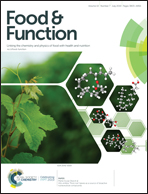Green tea polyphenols prevent lipopolysaccharide-induced inflammatory liver injury in mice by inhibiting NLRP3 inflammasome activation
Abstract
Inflammatory liver diseases present a significant public health problem. Green tea polyphenols (GTPs) have a myriad of health benefits in animals and humans, including alleviating of hepatic inflammation; however, the underlying mechanisms are complicated and remain unclear. The current study investigated the preventive effects and mechanism of GTPs on lipopolysaccharide (LPS)-induced inflammatory liver injury in mice. The ICR mice received intragastric GTPs once per day for 7 consecutive days prior to LPS stimulation (15 mg kg−1, intraperitoneally) and liver damage and oxidative stress, pro-inflammatory cytokines, and the hepatic nuclear factor-κB (NF-κB) and Nod-like receptor family, pyrin domain containing 3 (NLRP3) inflammasomes were observed. Our results showed that GTP supplementation significantly reduced LPS-induced plasma alanine aminotransferase (ALT) and aspartate aminotransferase (AST) levels and hepatic malondialdehyde (MDA) levels; and LPS-induced reduction of glutathione (GSH) levels and total superoxide dismutase (T-SOD) activities was drastically improved by GTP pretreatment. GTP supplementation significantly reduced plasma contents and hepatic mRNA levels of interleukin (IL)-1β, IL-18, IL-6, and tumor necrosis factor (TNF)-α, compared with LPS-treated mice which did not receive GTP treatment. In addition, the production of cytokines, such as IL-1β, IL-18, IL-6, and TNF-α in mice livers, and acute-phase response (plasma levels of nitric oxide and C-reactive protein) were also decreased following GTP pre-treatment. Furthermore, GTPs reduced LPS-induced hepatic NF-κB signaling and NLRP3 inflammasome activation. GTPs exert protective effects against inflammatory liver injury by regulating NF-κB signaling and the NLRP3 inflammasome activation. Our findings suggest that dietary GTP supplementation may be an adjunctive prevention and treatment for acute liver injury-associated inflammation.



 Please wait while we load your content...
Please wait while we load your content...